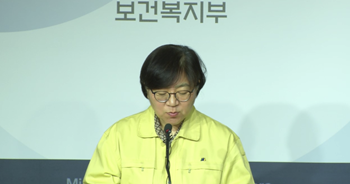Amid growing concerns about the spread of the new coronavirus, the Korea Centers for Disease Control and Prevention (KCDC) said Friday that neither latent infection nor infection through had been confirmed yet.
The KCDC also said it has requested the Chinese government for accurate data related to latent infection and is sharing information with China through a hotline.

In a news conference, KCDC Director Jung Eun-kyeong said there is not enough scientific evidence for latent infection, despite mounting concerns about such possibilities.
"We requested the Chinese Center for Disease Control and Prevention for related documents and talked to their director after Beijing announced that the virus is infectious during latency," Jung said. "However, the Chinese CDC has not provided or released clear evidence yet."
China should release a more scientific and objective proof for the scientific community so that the international community can study, verify, and respond together, she added. There were asymptomatic infections when the Middle East Respiratory Syndrome struck the world. However, there was no case of asymptomatic infections spreading to others. There should be a sufficient amount of virus to cause transmission.
The KCDC has established a hotline between China and is closely communicating with officials of the Chinese CDC through electronic mails and calls, Jung said. She added that her agency sent an epidemiologist to the South Korean embassy in Beijing,
"Ordinary people may think that simple eye contact can result in infection in transmission through the cornea but is not true," Jung said. "Rubbing eyes with contaminated hands can lead to transmission, however."
She also explained that infection without contact is impossible because the propagation path of the new coronavirus is for the droplet to fly over two meters and directly enter into the respiratory system.
"We will take full responsibility for the safety of Koreans. When Korean residents in Wuhan return, we will install and follow a manual for immigration quarantine, fever checks in temporary residences, and screen for showing symptoms," she noted.

